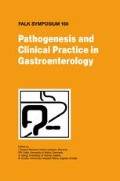Abstract
Biologics refer to novel exogenous protein-based molecules designed to recognize and bind specific antigens, including monoclonal antibodies or derivatives of monoclonal antibodies, in order to treat disease. In inflammatory bowel disease (IBD) biologics are largely directed at cytokines and receptors involved in T-cell activation as well as selective adhesion molecule blockers. Particularly, the success of the intravenously administered chimeric anti-tumour necrosis factor alpha (TNF-α) IgG1 antibody, infliximab, has set new treatment standards for IBD and substantially aided to drag Crohn’s disease (CD) and ulcerative colitis (UC) out of the attic into the spotlight of internal medicine. Infliximab has demonstrated efficacy in the induction and maintenance of remission in luminal and fistulizing CD both in adults and children, and patients with moderate to severe UC. Adalimumab, a fully human monoclonal antibody anti-TNF-α, has proved to be effective and safe in patients with CD after subcutaneous administration, both naive and refractory to infliximab. Certolizumab pegol, a subcutaneous pegylated anti-TNF-α Fab fragment, and natalizumab, a monoclonal 4-integrin antibody, suggested efficacy for luminal CD. Some evidence supports the theory that biologics not only control symptoms of CD but also may potentially alter the natural course of disease. However, economic costs and the risks of severe opportunistic infections associated with biologic therapy have still not settled the appropriate role for these agents in the clinical care of patients with IBD.
Access this chapter
Tax calculation will be finalised at checkout
Purchases are for personal use only
Preview
Unable to display preview. Download preview PDF.
References
Van den Brande JM, Bratt H, van den Brink GR et al. Infliximab but not etanercept induces apoptosis in lamina propria T-lymphocytes from patients with Crohn’s disease. Gastroenterology. 2003;124:1774–85.
Targan SR, Hanauer SB, van Deventer SJH et al. A short-term study of chimeric monoclonal antibody CA2 to tumor necrosis factor alpha for Crohn’s disease. N Engl J Med. 1997;337:1029–35.
Hanauer SB, Feagan BG, Lichtenstein GR et al. Maintenance infliximab for Crohn’s disease: the ACCENT I randomised trial. Lancet. 2002;359:1541–9.
Hyams JS, Crandall W, Kugathasan S et al. Induction and maintenance infliximab therapy for the treatment of moderate-to-severe Crohn’s disease in children. Gastroenterology. 2007;132:863–73.
D’Haens G, Baert F, van Assche G et al. Early combined immunosuppression or conventional management in patients with newly diagnosed Crohn’s disease: an open randomised trial. Lancet. 2008;371:660–7.
Sands BE, Anderson FH, Bernstein CN et al. Infliximab maintenance therapy for fistulizing Crohn’s disease. N Engl J Med. 2004;350:876–85.
Rutgeerts P, Sandborn WJ, Feagan BG et al. Infliximab for induction and maintenance therapy for ulcerative colitis. N Engl J Med. 2005;353:2462–76.
Jarnerot G, Hertervig E, Friis-Liby I et al. Infliximab as rescue therapy in severe to moderately severe ulcerative colitis: a randomized, placebo-controlled study. Gastroenterology. 2005;128:1805–11.
Hanauer SB, Sandborn WJ, Rutgeerts P et al. Human anti-tumor necrosis factor monoclonal antibody (adalimumab) in Crohn’s disease: the CLASSIC-I trial. Gastroenterology. 2006;130:323–33.
Colombel JF, Sandborn WJ, Rutgeerts P et al. Adalimumab for maintenance of clinical response and remission in patients with Crohn’s disease: the CHARM trial. Gastroenterology. 2007;132:52–65.
Sandborn WJ, Rutgeerts P, Enns R et al. Adalimumab induction therapy for Crohn disease previously treated with infliximab: a randomized trial. Ann Intern Med. 2007;146:829–38.
Fossati G, Nesbitt A. Effect of the anti-TNF agents, adalimumab, etanercept, infliximab, and certolizumab PEGOL (CDP870) on the induction of apoptosis in activated peripheral blood lymphocytes and monocytes. Am J Gastroenterol. 2005;100(Suppl.):S298–9.
Sandborn WJ, Feagan BG, Stoinov S et al. PRECISE 1 Study Investigators. Certolizumab pegol for the treatment of Crohn’s disease. N Engl J Med. 2007;357:228–38.
Schreiber S, Khaliq-Kareemi M, Lawrance IC et al. Maintenance therapy with certolizumab pegol for Crohn’s disease. N Engl J Med. 2007;357:239–50.
Baumgart DC, Sandborn WJ. Inflammatory bowel disease: clinical aspects and established and evolving therapies. Lancet. 2007;369:1641–57.
Sandborn WJ, Colombel JF, Enns R et al. Natalizumab induction and maintenance therapy for Crohn’s disease. N Engl J Med. 2005;353:1912–25.
Targan SR, Feagan B, Fedorak R et al. Natalizumab induces sustained response and remission in patients with active Crohn’s disease: results from the Encore trial. Gastroenterology. 2006;130(Suppl. 2):A108 (Abstract).
Van Assche G, Van Ranst M, Sciot R et al. Progressive multifocal leukoencephalopathy after natalizumab therapy for Crohn’s disease. N Engl J Med. 2005;353:362–8.
Feagan BG, Greenberg GR, Wild G et al. Treatment of ulcerative colitis with a humanized antibody to the a4b7 integrin. N Engl J Med. 2005;352:2499–507.
Reinisch W, Hommes DW, van Assche G et al. A dose escalating, placebo controlled. double blind, single dose and multidose, safety and tolerability study of fontolizumab, a humanised anti-interferon gamma antibody, in patients with moderate to severe Crohn’s disease. Gut. 2006;55:1138–44.
Mannon PJ, Fuss IJ, Mayer L et al. Anti-interleukin-12 antibody for active Crohn’s disease. N Engl J Med. 2004;351:2069–79.
Schreiber S, Fedorak RN, Nielsen OH et al. and the Crohn’s Disease IL-10 Cooperative Study Group. Safety and efficacy of recombinant human interleukin 10 in chronic active Crohn’s disease. Gastroenterology. 2000;119:1461–72.
van Assche G, Sandborn WJ, Feagan BG et al. Daclizumab, a humanised monoclonal antibody to the interleukin 2 receptor (CD25), for the treatment of moderately to severely active ulcerative colitis: a randomised, double blind, placebo controlled, dose ranging trial. Gut. 2006;55:1568–74.
Creed TJ, Norman MR, Probert CS et al. Basiliximab (anti-CD25) in combination with steroids may be an effective new treatment for steroid-resistant ulcerative colitis. Aliment Pharmacol Ther. 2003;18:65–75.
Author information
Authors and Affiliations
Editor information
Editors and Affiliations
Rights and permissions
Copyright information
© 2008 Springer and Falk Foundation e.V.
About this paper
Cite this paper
Reinisch, W. (2008). Biologics, novel therapeutic alternatives in inflammatory bowel disease. In: Ferkolj, I., Gangl, A., Galle, P.R., Vucelic, B. (eds) Pathogenesis and Clinical Practice in Gastroenterology. Falk Symposium, vol 160. Springer, Dordrecht. https://doi.org/10.1007/978-1-4020-8767-7_8
Download citation
DOI: https://doi.org/10.1007/978-1-4020-8767-7_8
Publisher Name: Springer, Dordrecht
Print ISBN: 978-1-4020-8766-0
Online ISBN: 978-1-4020-8767-7
eBook Packages: MedicineMedicine (R0)

